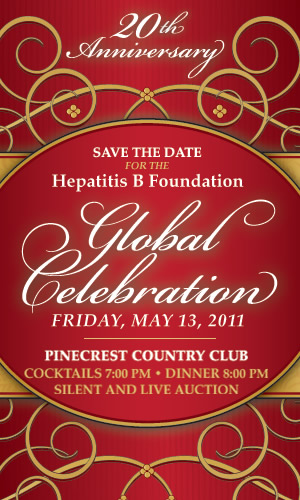|
This World Hepatitis Day message by Dr. Philanbangchang, WHO South-East Asia addresses some of the many challenges of viral hepatitis in the South-East Asia region, and also applies to other areas of the world. However, it is interesting to first note some fast facts specifically about hepatitis B…
And now a message from Dr. Philanbangchang… Viral hepatitis kills more people than any other communicable disease in the South-East Asia Region. In the next 10 years, over five million people in the region is projected to die from this disease and its consequences. Today, more than 130 million people in South-East Asia alone, carry the hepatitis B or C virus, even though they may appear healthy. It usually strikes people at their most productive age. The hepatitis B virus is 50 to 100 times more infectious than HIV, and just as lethal. Hepatitis E results in 2700 still births every year. For such a major public health threat, hepatitis has a low profile, among policy-makers and the public. Recognising hepatitis as a threat to public health, the World Health Assembly passed a resolution to prevent and control the disease last year. The World Health Organization has decided to observe July 28 this year as the world’s first ever World Hepatitis Day. It is thus an opportune time to ask if we are doing enough to protect ourselves from this disease? Many people recognise the symptoms of jaundice by the yellowing of the eyes and skin. Yet, jaundice is only the face of the disease and the common symptom for any of the four common types of viral hepatitis. These are easily contracted from drinking water to casual contact to sexual intercourse. Even then, not every infected person shows symptoms. WHO is developing guidelines, strategies and tools for surveillance, prevention and control of this disease. Prevention and focussing on the source and mode of spread of the virus, is crucial to control this disease. Chronic hepatitis B and C are among the leading causes of preventable deaths in 11 countries of the region. About 100 million hepatitis B carriers, and 30 million hepatitis C carriers, live in South-East Asia. However, about 60 percent of the infected are unaware of their status until the disease manifests as cirrhosis or liver cancer – an aggressive cancer without a cure. Hepatitis C, in particular, has no vaccine or effective cure. Those who undergo blood transfusion, as well as injecting drug users, are at risk. Due to lack of knowledge and resources among healthcare workers, many providers in the region do not comply with WHO’s and national guidelines and recommendations for hepatitis B and C screening, prevention, treatment and follow-up services. A patient requiring transfusion may receive blood that has been screened for HIV, but not for hepatitis B or C. The hepatitis B vaccine can go a long way to prevent hepatitis B. It is more than 95 percent effective in preventing infections and their chronic consequences, and is the first vaccine that protects against a major human cancer. In WHO’s South-Asia Region, more than 130 million infants have received the three required doses of hepatitis B vaccine. Hepatitis infection is also linked to personal hygiene, sanitation and urban health – hepatitis A and E are both commonly spread through eating or drinking contaminated food or water. Pregnant women are at high risk of hepatitis E. Hepatitis E acquired during pregnancy is also associated with prematurity, low birth weight and an increased risk of perinatal mortality. In countries of WHO’s South-East Asia Region, more than 6.5 million people are infected with hepatitis E annually accounting for half the cases worldwide, leading to an estimated 160 000 deaths. Hepatitis E outbreaks often occur in urban areas when leaky underground water pipes are contaminated with sewage. In developing countries, with increasing population pressure and rapid urbanisation leading to people living in close, unsanitary conditions, such diseases are likely to increase rapidly. So what can be done to prevent and control hepatitis? To begin with, all countries, especially those urbanising rapidly, need to make hepatitis a health priority. Lives could be saved through simple preventive measures such as hand washing, eating cooked food and boiled water, using condoms and not sharing needles. Countries need to make screening of all blood and blood products for hepatitis B and C mandatory. Governments should ensure that children are adequately immunised against hepatitis B. Healthcare workers, and the public, need to be educated on the risks and the surveillance system for hepatitis needs to be strengthened. Unless we act now to create greater awareness among policymakers, healthcare workers, and the public, viral hepatitis will remain a major public health threat. Dr Samlee Plianbangchang |








 The Hepatitis B Foundation
The Hepatitis B Foundation 